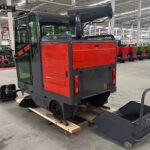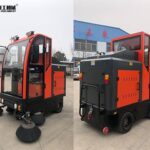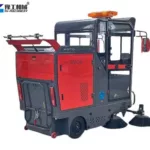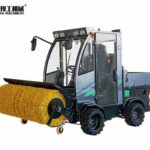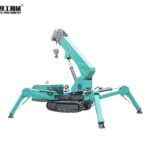Mini street sweeper is a scaled-down version of traditional street sweepers, engineered to deliver powerful cleaning performance in a smaller footprint. These machines typically combine advanced suction technology, rotating brushes, and water spray systems to collect debris, dust, and pollutants from streets, sidewalks, warehouses, and other confined areas. Unlike their bulkier counterparts, small street sweepers prioritize maneuverability, making them ideal for urban alleyways, pedestrian zones, parking garages, and indoor facilities.
Applications of Mini Street Sweepers
Municipal Roads and Streets: They are used to keep city streets clean and free of debris, improving traffic safety and enhancing the overall aesthetic of urban areas.
Parking Lots: Mini sweepers efficiently clean parking lots, removing leaves, litter, and other debris that can accumulate over time.
Industrial Sites: In industrial settings, these sweepers help maintain a clean and safe working environment by removing dust, oil, and other contaminants from floors and walkways.
Advantages of Choosing a Small Road Sweeper
The growing popularity of the mini street sweeper is driven by a range of significant benefits that make it an attractive option for numerous cleaning tasks:
Unmatched Maneuverability and Accessibility: This is arguably the primary advantage. Mini sweepers can navigate narrow pathways, tight corners, crowded pedestrian zones, sidewalks, bike lanes, parking garages, and indoor industrial spaces where larger machines simply cannot go.
Cost Effectiveness: Generally, mini road sweepers have a lower initial purchase price compared to large municipal sweepers. Furthermore, their operating costs are often significantly reduced due to lower fuel or electricity consumption, smaller replacement parts (like brushes), and potentially lower maintenance requirements.
Environmental Friendliness: Many modern mini street sweepers are available in electric, battery powered versions. These models produce zero direct emissions during operation, contributing to better air quality, particularly important in dense urban areas or enclosed spaces like warehouses. They also operate much more quietly than their fossil fuel powered counterparts. Even engine powered mini sweepers are often designed with fuel efficiency and emissions standards in mind.
Reduced Noise Pollution: The quieter operation, especially of electric models, is a major benefit in residential areas, hospital zones, university campuses, and city centers where noise restrictions may be in place or where minimizing disturbance is crucial. Cleaning operations can often be conducted during off peak hours without causing significant noise complaints.

